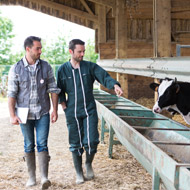RCVS accepts proposal for Certification Support Officers

The Certification Support Officer would work under the direction of the Official Veterinarian responsible for signing export certificates.
The RCVS has accepted the Animal and Plant Health Agency’s (AHPA) proposal for the new role of Certification Support Officer (CSO), who would assist Official Veterinarians with tasks related to certification.
In a statement, the RCVS said: ‘RCVS Standards Committee considered the proposal on Wednesday 26 September at its regularly-scheduled meeting. The Committee’s fundamental focus was on retaining the value and integrity of veterinary certification.
‘The Committee concluded that the proposals were acceptable in principle and that further discussions should now proceed with the British Veterinary Association (BVA) before the proposal is referred to RCVS Council for ultimate decision at its meeting in November 2018.’
The proposal was developed in response to concerns over the existing veterinary workforce shortage and Brexit. In October 2017, chief vet Nigel Gibbens predicted this could lead to a 325 per cent rise in the need for veterinary certifications.
Under the AHPA’s proposal, the Certification Support Officer would work under the direction of the Official Veterinarian responsible for signing export certificates. The role would not involve the certification of live animals or germinal products, and the act of certification would still be the responsibility of a veterinary surgeon.
The RCVS said that applicants for the role would need to undergo identity checks, six hours of accredited online distance learning, a period of supervision under a qualified colleague and refresher training and revalidation every two years.
Commenting, RCVS Registrar Eleanor Ferguson said: “APHA has asked us to consider amending the RCVS Ten Principles of Certification and Supporting Guidance on Certification in order to recognise the role of CSOs in official certification, which they hope to have approved in time for the UK’s exit from the EU in March 2019.
“Throughout discussions, upholding the integrity and value of the veterinary signature has been our core principle when considering how CSOs could work as part of a vet-led team and support administrative tasks related to certification.”



 The Federation of Independent Veterinary Practices (FIVP) has announced a third season of its podcast, Practice Matters.
The Federation of Independent Veterinary Practices (FIVP) has announced a third season of its podcast, Practice Matters.